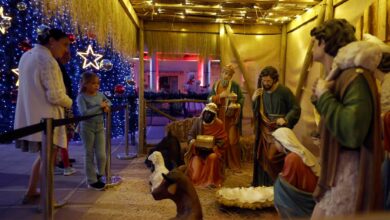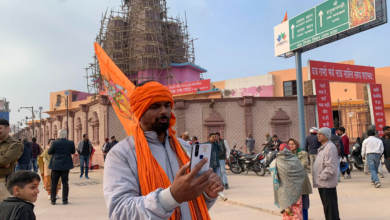Countries That Do Not Celebrate Christmas Or Celebrate It In A Very Different Way
Christmas celebrations have different meanings and customs in different parts of the world. In some countries, they do not celebrate Christmas by religion or celebrate it differently.

If at the national level the celebrations tend to be different from one region to another, it is even more so when it is spoken at the global level. Photo: Unsplash
LatinAmerican Post | Luis Angel Hernández Liborio
Listen to this article
Leer en español: Países que no celebran Navidad o la celebran de manera muy distinta
If at the national level the celebrations tend to be different from one region to another, it is even more so when it is spoken at the global level. Christmas seems to be one of those universal celebrations, but in reality it is not. Its evident Christian background means that it is limited to countries with a majority of this religion, however, it has also managed to become part of the celebrations where it is not professed, although it acquires a different nuance. These are some of the customs in December in countries where Christmas is little or no celebration.
#Hawaii Fact: Merry Christmas in Hawaiian is Mele Kalikimaka.
Santa on a surfboard in front of @polynesia pic.twitter.com/E7YmjnMI3p— Ray Davis (@hawaiiphotos) November 12, 2017
Christmas in Japan, China, and India
Although there is no religion or belief that unifies these three countries, the little or no presence of Christianity in them does encompass them. Especially interesting is the case of Japan with 88.9 million Shintoists, a far cry from the 1.9 million Christians, according to data from the US State Department. However, Christmas has an important presence in the land of the rising sun, as do other celebrations of religious origin such as Valentine's Day that have been adapted with a different meaning. Christmas is usually a family and emotional celebration in the West, while in Japan it is a day to spend with friends, do some shopping or go out to have fun as a couple.
Tokyo’s Christmas Market is on until 12/25 at Hibiya Park but beware – this year there is a ¥1000 entry fee and if you don’t book online, you’ll wait 30 minutes in a queue just like waiting for Santa at the mall 11:00 to 22:00 pic.twitter.com/y4l6zxoHk2
— John Daub (ONLY in JAPAN) (@ONLYinJAPANtv) December 14, 2021
In India, the festival of lights, Diwali, draws attention almost a month before Christian Christmas. According to Indian Culture it is the most important celebration among the Indians, gifts are exchanged, typical dishes are eaten and new clothes are worn. On the other hand, the Christian celebration only occurs among those who profess the religion and who are a minority in the country, so it goes almost unnoticed. In China the phenomenon is similar to that of Japan, the western influence has made the Chinese adapt the celebration as a day of friendship, shopping and consumption, but without the religious component or the solemnity that accompanies it.
For those who do not know, Diwali is the festival of lights. It is India’s biggest and most important festival of the year.
So to our Indian followers, we wish you and your family a Diwali filled with happiness, prosperity, and joy. Happy Diwali#diwali #india #festivaloflights pic.twitter.com/oO8zAiKBlW
— heartofagiant (@heartofagiant) November 5, 2021
The Islamic world
Jesus is not a character outside the Islamic world, he is mentioned in the Koran, the holy book of Muslims, as a prophet. That is, the divine origin of his birth is recognized through the Virgin Mary and her role as a diffuser of the word of God (Allah). So why is Christmas not celebrated in the Muslim world? The answer is simple, the cult of everything that is not God is prohibited, the word of the prophets is celebrated, but not their birth, nor does the cult of their personality or images exist, this explains why Muhammad should not be represented. nor celebrated "western style."
There are extreme cases such as Saudi Arabia or Somalia where public demonstrations of any celebration related to Christmas are illegal. There are also Muslim countries that "tolerate" the celebrations of Christian minorities, especially those that have strengthened their commercial relations with Europe. and the United States, among them Qatar and the United Arab Emirates stand out, where the festivities are almost as big as in any city in Europe, with crowded shopping malls and decorations. Even in countries like Turkey, with a great Western influence, they celebrate festivities with lighting and even a Christmas tree (New Year tree), but without relating them to the birth of Jesus.
Christmas in Dubai is next level amaaaaaazing pic.twitter.com/hKAwgNlaQm
— Rhea Mathew (@rhea_mathew) December 7, 2021
The case of Israel is special, as a nerve center for Islam, Christianity and Judaism, religions with common origins. For the Muslims Jesus was a prophet, for the Jews he was not the Messiah, while for the Christians his importance is evident, so the minority that profess him in Israel must coexist in their celebrations with the other two religions. With them he has points in common, but at the same time great dogmatic differences that of course explain the deep historical conflicts in this region of the world.
December in Haifa, when Jewish menorahs mingle with Christmas trees and Muslim crescents.
Haifa, Israel, is a model of multiculturalism and coexistence.
@CogatArabic pic.twitter.com/K5s9wChfVS
— Yonatan Gonen (@GonenYonatan) December 9, 2021
You can also read: Gallery: The Most Powerful Women In Latin America In 2021
Orthodox Christians
Christianity, although widespread in much of the world, is neither unitary nor homogeneous, therefore their differences also influence the celebrations. Orthodox Christianity was born out of the schism with Catholicism and the spreading power of the Byzantine Empire. Its area of influence extends through central Europe, the Balkans and even Russia, mainly. The interesting mixture of cultures that occurred in this part of the world have made Christmas have unique customs that differentiate it from the western one. One of the great differences is in the date, while in the West it is celebrated on December 25, among the Orthodox it is celebrated on January 7, this is due to the calendar they use in each region. Catholics are governed by the Gregorian calendar and Orthodox by the Julian calendar.
???? #SabíasQue… en #Rusia, la #Navidad se celebra el 7⃣ de enero, según el calendario juliano ????, que lleva un desfase de 13 días respecto al que usamos nosotros, el gregoriano?
Conoce más sobre nuestras tradiciones navideñas
https://t.co/ywv6TpIlzY pic.twitter.com/lmGFkVl708
— Embajada de Rusia en México (@EmbRusiaMexico) December 28, 2020




